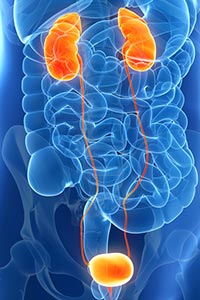Urologic Diseases

Urologic diseases, disorders, and conditions affect people of all ages, result in significant health care expenditures, and may lead to substantial disability and impaired quality of life. Non-cancerous (benign) urologic health problems include urinary tract infections, kidney stones, urinary incontinence, and benign prostatic hyperplasia (an enlarged prostate). Interstitial cystitis/bladder pain syndrome (IC/BPS), a debilitating and painful condition, affects an estimated 3.3 million women, and researchers estimate 1.6 million men have chronic prostatitis/chronic pelvic pain syndrome (CP/CPPS) consisting of urologic symptoms such as pain with bladder filling. Based upon national public health surveys conducted over several years, about 54 percent of women (20 years and older) report urinary incontinence in the past 12 months. Urinary incontinence was self-reported by approximately 15 percent of men surveyed. Many suffer in silence due to embarrassment and lack of knowledge about available treatment options.
NIDDK supports basic, clinical, and translational research on the normal and abnormal development, structure, function, infection, and injury repair of the genitourinary tract, to advance our ability to combat urologic conditions and improve urologic health. For example, NIDDK-supported researchers are:
- Gaining insights into urinary tract infections that have led to potential new treatments and are paving the way for others;
- Investigating new treatments for kidney stones in adults and children;
- Mapping molecular and cellular pathways in the development of the genitourinary tract, establishing a knowledge base that could help in addressing acute injuries and correcting birth defects;
- Working to define bladder health and establish the scientific basis for future prevention-focused intervention studies for lower urinary tract symptoms and conditions in women and girls; and
- Focusing on understanding the causes of IC/BPS and CP/CPPS, identifying “biomarkers” to help in diagnosis, and improving treatment options.
NIDDK-supported studies over the past several years have helped to advance knowledge about the efficacy of surgical treatment of urinary incontinence and to provide new insights into non-surgical alternatives.
In addition, NIDDK has congressional authorization for the National Kidney and Urologic Diseases Information Clearinghouse, which provides services via the NIDDK Health Information Center. NIDDK responds to questions and provides health information about urologic diseases to people with urologic diseases and to their families, health professionals, and the public.
Research Updates and News
- Improving Kidney Stone Measurements With Automated Systems
- Lower Urinary Tract Symptoms Network (LURN): Development and Use of Improved Assessments of Urinary Symptoms
- Discovering the Risks of Developing Symptoms Due to Ureteral Stent Placement
- New insights into overactive bladder urinary symptoms
- Removing asymptomatic kidney stones during symptomatic stone removal surgery may result in lower risk of recurrence
What We Do
To achieve its mission, NIDDK supports, conducts, coordinates, and plans research. NIDDK also provides data and samples from NIDDK-funded studies and explains research findings to health professionals and the public.
Support Research
NIDDK invests in basic, clinical and translational research and training at colleges, universities and other institutions.
- Diabetic Urologic Disease
- Pediatric Urology
- Urologic Disease Centers
- Urology Basic Research
- Urology Bioengineering, Biotechnology, and Imaging
- Urology Clinical Research and Epidemiology
- Urology Developmental Biology and Aging
Conduct Research
NIDDK investigators conduct biomedical research and training in the Institute's laboratories and clinical facilities in Maryland and Arizona.
View all Labs & BranchesCoordinate & Plan Research
NIDDK takes multiple approaches to research planning and priority setting.
Meetings & Workshops
There are no upcoming related meetings or workshops at this time.
View all Meetings & WorkshopsStrategic Plans & Reports
View all Strategic Plans & ReportsProvide Access to Research Resources
NIDDK makes publicly supported resources, data sets, and studies available to researchers.
View all Research ResourcesProvide Health Information
NIDDK provides patient education information, practice tools for diagnosis and treatment, and statistics.

